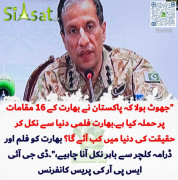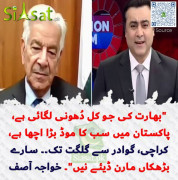sagaciouscorpion
MPA (400+ posts)
Peres prays for 'safety' of Musharraf
By Kesava Menon
MANAMA (Bahrain), OCT. 29. The Israeli Foreign Minister, Mr. Shimon Peres, has said that he, as a ``good Jewish boy'', is currently undergoing a novel experience - praying for the safety of the Pakistan President, Gen. Pervez Musharraf.
In a nutshell Mr. Peres appears to have summed up the dilemma facing not just his country but India as well. Neither
country likes Gen. Musharraf or his regime but fear that he could be replaced by someone worse. Both are also extremely sceptical of Pakistan's contribution to counter-terrorism, are worried that their own terrorism concerns will be brushed aside but yet have to hold back if they are not to upset the U.S.
Israel has, according to some readings, floated
dangerously close to the point where its friendship with the U.S. could have been damaged on several occasions. The Israeli Prime Minister, Mr. Ariel Sharon, had compared Washington's efforts to draw the Arab world into the anti-terror coalition with the appeasement policy of the western powers towards Nazi Germany at the time of the Munich Pact. This remark had invited a
sharp and direct rebuke from the U.S. President, Mr. George W. Bush.
Neither had Mr. Sharon's comments likening the Palestinian Authority President, Mr. Yasser Arafat, to Osama bin Laden, the terrorist mastermind, gone down too well in the west. The relationship between Israel and the U.S. could have reached a serious turning point last week when the former - in a move akin to the ``hot pursuit'' policy that some in the Indian Government have advocated - sent its military back into the previously liberated parts of the Palestinian territories.
Washington, mindful of the effect the incursions could have on a Muslim world that is already tense over the military campaign in Afghanistan, initially called for an immediate withdrawal. Israel's argument that it had done so in order to force the Palestinian Authority to arrest militants who had assassinated Israeli Minister Rehavam Ze'evi did not appear to cut much ice with the U.S. In an interview that he gave Newsweek and Washington Post (wherein he said he was praying for Gen. Musharraf) Mr. Peres claimed that he had made Washington understand that the incursion into six West Bank towns was temporary and for a limited purpose. In accepting this explanation, Mr. Peres said, the U.S. administration had turned down its demand from a call for ``an immediate pullout'' to a ``pullout as soon as possible''.
It was in connection with the barely veiled reference to his misgiving about Pakistan's leader that Mr. Peres also gave a hint of the dilemma his country was in. Despite the misgivings Israel did not want to disturb the relations between the U.S. and Pakistan at this juncture, Mr. Peres hinted when he said, ``But we understand and don't want to have an agenda of our own'' - an agenda that would undermine the U.S. efforts.
He was asked specifically about how Israeli- Palestinian frictions could disrupt Washington's ties with the Arab world and whether the U.S. administration had asked Israel to take specific steps. His reply was that his country ``was not being asked to make concessions but to change the atmosphere'' - to keep a low profile and to try and reduce tensions.
Israel's relations with the U.S. are of quite a different order from that between New Delhi and Washington. The U.S. is also firmly convinced that Israel is under threat from terrorism including its state-sponsored version while it is far from conceding that India too faces the same kind of threats. But the Israelis are also far more clued into how the U.S. establishment thinks and if the Israelis believe that all they are being asked to do is to ``change the atmosphere'' - not concede on principles - it is an approach that should be taken note of by India.
The Hindu, Tuesday Oct 30 2001
By Kesava Menon
MANAMA (Bahrain), OCT. 29. The Israeli Foreign Minister, Mr. Shimon Peres, has said that he, as a ``good Jewish boy'', is currently undergoing a novel experience - praying for the safety of the Pakistan President, Gen. Pervez Musharraf.
In a nutshell Mr. Peres appears to have summed up the dilemma facing not just his country but India as well. Neither
country likes Gen. Musharraf or his regime but fear that he could be replaced by someone worse. Both are also extremely sceptical of Pakistan's contribution to counter-terrorism, are worried that their own terrorism concerns will be brushed aside but yet have to hold back if they are not to upset the U.S.
Israel has, according to some readings, floated
dangerously close to the point where its friendship with the U.S. could have been damaged on several occasions. The Israeli Prime Minister, Mr. Ariel Sharon, had compared Washington's efforts to draw the Arab world into the anti-terror coalition with the appeasement policy of the western powers towards Nazi Germany at the time of the Munich Pact. This remark had invited a
sharp and direct rebuke from the U.S. President, Mr. George W. Bush.
Neither had Mr. Sharon's comments likening the Palestinian Authority President, Mr. Yasser Arafat, to Osama bin Laden, the terrorist mastermind, gone down too well in the west. The relationship between Israel and the U.S. could have reached a serious turning point last week when the former - in a move akin to the ``hot pursuit'' policy that some in the Indian Government have advocated - sent its military back into the previously liberated parts of the Palestinian territories.
Washington, mindful of the effect the incursions could have on a Muslim world that is already tense over the military campaign in Afghanistan, initially called for an immediate withdrawal. Israel's argument that it had done so in order to force the Palestinian Authority to arrest militants who had assassinated Israeli Minister Rehavam Ze'evi did not appear to cut much ice with the U.S. In an interview that he gave Newsweek and Washington Post (wherein he said he was praying for Gen. Musharraf) Mr. Peres claimed that he had made Washington understand that the incursion into six West Bank towns was temporary and for a limited purpose. In accepting this explanation, Mr. Peres said, the U.S. administration had turned down its demand from a call for ``an immediate pullout'' to a ``pullout as soon as possible''.
It was in connection with the barely veiled reference to his misgiving about Pakistan's leader that Mr. Peres also gave a hint of the dilemma his country was in. Despite the misgivings Israel did not want to disturb the relations between the U.S. and Pakistan at this juncture, Mr. Peres hinted when he said, ``But we understand and don't want to have an agenda of our own'' - an agenda that would undermine the U.S. efforts.
He was asked specifically about how Israeli- Palestinian frictions could disrupt Washington's ties with the Arab world and whether the U.S. administration had asked Israel to take specific steps. His reply was that his country ``was not being asked to make concessions but to change the atmosphere'' - to keep a low profile and to try and reduce tensions.
Israel's relations with the U.S. are of quite a different order from that between New Delhi and Washington. The U.S. is also firmly convinced that Israel is under threat from terrorism including its state-sponsored version while it is far from conceding that India too faces the same kind of threats. But the Israelis are also far more clued into how the U.S. establishment thinks and if the Israelis believe that all they are being asked to do is to ``change the atmosphere'' - not concede on principles - it is an approach that should be taken note of by India.
The Hindu, Tuesday Oct 30 2001






























